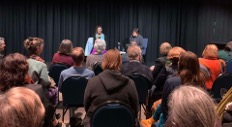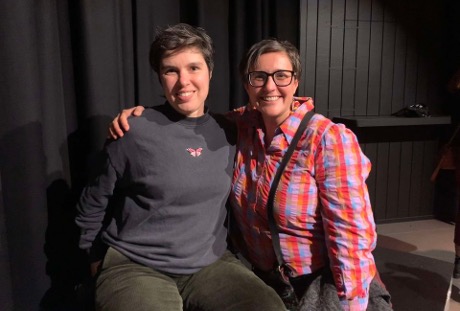
By Olivia Brozecki (she/her), Co-ordinator of Rainbow Network, part of Rainbow Health Australia, at the Australian Research Centre of Sex, Health and Society, La Trobe University.
Due to a few minor injuries and not being particularly fond of early rising, I’ve taken up swimming. I love the repetitive, meditative strokes and the way swimming forces you to breathe deeply and rhythmically. I haven’t returned to the pool since our rainbow family arrived back in Oz after a heart and soul expanding adventure in the lands of my ancestors, where I collected the same wildflowers my mother remembered collecting as a child, and placed them on the worn tombstones of people I’ve never met with familiar surnames. And although all this took place in a country that no longer exists as my mother knew it (Yugoslavia), I’ve never felt more connected to country.

The audience at the conversation
So, it was with much anticipation my partner and I attended a special Write Around the Murray and La Trobe University In Conversation with Ellen van Neerven event, followed by the play they have written, called swim. Ellen van Neerven (they/them) is a non-binary thought-provoking poet and author of Mununjali Yugambeh and Dutch heritage, and now they can add ‘playwright’ to their award-winning repertoire. They have developed a knack for playing with genres in new and exciting ways that often leave the audience spellbound – and swim is no exception.
Before the play, I joined over fifty locals to hear from van Neerven and swim’s director, Yorta Yorta/Gunaikurnai theatre maker Andrea James. They described the balancing act between genres, translating poetry into theatre, “which isn’t easy to do,” said James. We learned about the inspiration that turned van Neerven’s tentative hand to play-writing; a 1970’s ‘choreopeam’ by African American Ntozake Shange’s For Colored Girls Who have Considered Suicide / When the Rainbow Is Enuf, a series of monologues accompanied by dance and music – recently reimagined on Broadway.
Like any live performance, every show is a unique experience, and this time-sensitivity, this fluidity, is best symbolised by water.
In Conversation, we learnt that the audio and video projections that theatre-goers witnessed was recorded by the crew, who visited van Neerven’s home on Mununjali Yugambeh country (south-east Brisbane). “I don’t think we could’ve made this play without visiting your country,” said James to van Neerven.

Ellen van Neerven with fan Olivia Brozecki
And just like water, gender is explored in a way that is just as fluid. Just as authentic. The protagonist, named E, is played by Baad and Yawuru non-binary person Dani Sib (from Bran Nue Dae). “Representation is very important,” said van Neerven when I asked about this very conscious link between writer and actor.
While watching E navigate a gendered world – binary options for change rooms, limiting government forms and uncomfortable swimwear options, I was reminded of the trans, gender diverse and non-binary young people I’ve had the privilege to work with and for over the years.
Swimming against binary gendered assumptions and norms, and constantly having to navigate systems not made for you, must be incredibly exhausting. But E returns to the water, finds their strength, and keeps on swimming.
Box Office & Administration Hours
The Box Office at the Butter Factory Theatre is open 45 minutes prior to each show.
Administration open Monday to Friday 10:00 AM to 3:00 PM
Acknowledgment of Country
We acknowledge Aboriginal and Torres Strait Islander peoples as the traditional custodians of our land. We pay respect to all Aboriginal and Torres Strait Elders past, present, and future.
Contact Us
Phone: 02 6021 7433
Postal Address: PO Box 479
Wodonga VIC 3689